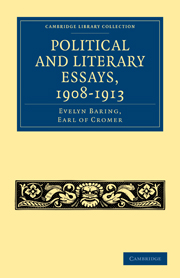Book contents
- Frontmatter
- PREFACE
- Contents
- “THE EDINBURGH REVIEW”
- “THE QUARTERLY REVIEW”
- “THE NINETEENTH CENTURY AND AFTER”
- “THE SPECTATOR”
- VIII DISRAELI
- IX RUSSIAN ROMANCE
- X THE WRITING OF HISTORY
- XI THE GREEK ANTHOLOGY
- XII LORD MILNER AND PARTY
- XIII THE FRENCH IN ALGERIA
- XIV THE OTTOMAN EMPIRE
- XV WELLINGTONIANA
- XVI BURMA
- XVII A PSEUDO-HERO OF THE REVOLUTION
- XVIII THE FUTURE OF THE CLASSICS
- XIX AN INDIAN IDEALIST
- XX THE FISCAL QUESTION IN INDIA
- XXI ROME AND MUNICIPAL GOVERNMENT
- XXII A ROYAL PHILOSOPHER
- XXIII ANCIENT ART AND RITUAL
- XXIV PORTUGUESE SLAVERY
- XXV ENGLAND AND ISLAM
- XXVI SOME INDIAN PROBLEMS
- XXVII THE NAPOLEON OF TAINE
- XXVIII SONGS, PATRIOTIC AND NATIONAL
- XXIX SONGS, NAVAL AND MILITARY
- INDEX
X - THE WRITING OF HISTORY
Published online by Cambridge University Press: 07 September 2011
- Frontmatter
- PREFACE
- Contents
- “THE EDINBURGH REVIEW”
- “THE QUARTERLY REVIEW”
- “THE NINETEENTH CENTURY AND AFTER”
- “THE SPECTATOR”
- VIII DISRAELI
- IX RUSSIAN ROMANCE
- X THE WRITING OF HISTORY
- XI THE GREEK ANTHOLOGY
- XII LORD MILNER AND PARTY
- XIII THE FRENCH IN ALGERIA
- XIV THE OTTOMAN EMPIRE
- XV WELLINGTONIANA
- XVI BURMA
- XVII A PSEUDO-HERO OF THE REVOLUTION
- XVIII THE FUTURE OF THE CLASSICS
- XIX AN INDIAN IDEALIST
- XX THE FISCAL QUESTION IN INDIA
- XXI ROME AND MUNICIPAL GOVERNMENT
- XXII A ROYAL PHILOSOPHER
- XXIII ANCIENT ART AND RITUAL
- XXIV PORTUGUESE SLAVERY
- XXV ENGLAND AND ISLAM
- XXVI SOME INDIAN PROBLEMS
- XXVII THE NAPOLEON OF TAINE
- XXVIII SONGS, PATRIOTIC AND NATIONAL
- XXIX SONGS, NAVAL AND MILITARY
- INDEX
Summary
“The Spectator,” April 26, 1913
What are the purposes of history, and in what spirit should it be written? Such, in effect, are the questions which Mr. Gooch propounds in this very interesting volume. He wisely abstains from giving any dogmatic answers to these questions, but in a work which shows manifest signs of great erudition and far-reaching research he ranges over the whole field of European and American literature, and gives us a very complete summary both of how, as a matter of fact, history has been written, and of the spirit in which the leading historians of the nineteenth century have approached their task.
Mr. Bryce, himself one of the most eminent of modern historians, recently laid down the main principle which, in his opinion, should guide his fellow-craftsmen. “Truth,” he said, “and truth only is our aim.” The maxim is one which would probably be unreservedly accepted in theory by the most ardent propagandist who has ever used history as a vehicle for the dissemination of his own views on political, economic, or social questions. For so fallible is human nature that the proclivities of the individual can rarely be entirely submerged by the judicial impartiality of the historian. It is impossible to peruse Mr. Gooch's work without being struck by the fact that, amongst the greatest writers of history, bias—often unconscious bias—has been the rule, and the total absence of preconceived opinions the exception.
- Type
- Chapter
- Information
- Political and Literary Essays, 1908–1913 , pp. 214 - 225Publisher: Cambridge University PressPrint publication year: 2010First published in: 1913

